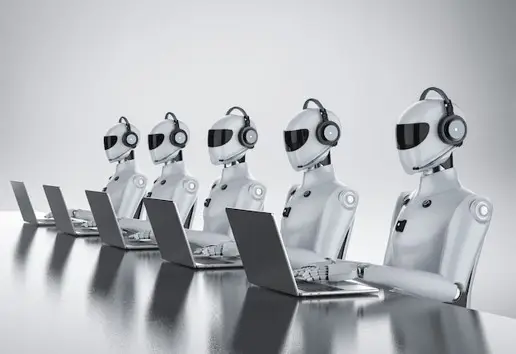In the ever-evolving landscape of customer service, businesses are constantly seeking innovative approaches to enhance their customer support strategies. With the rapid advancement of technology, contact center services have undergone a profound transformation, leading to the emergence of virtual assistants and chatbots as catalysts for change. These intelligent solutions are revolutionizing the way companies interact with their customers, offering a glimpse into the future of contact center services. In this article, we explore the remarkable potential of virtual assistants and chatbots, examining how they are reshaping customer experiences and redefining the standards of customer support.
Embracing the Rise of Virtual Assistants
The rise of virtual assistants and chatbots has brought about a paradigm shift in contact center services. Virtual assistants, powered by artificial intelligence (AI), have become an indispensable asset for contact centers across various industries. These intelligent software programs are designed to interact with customers, answer their queries, and provide support in a conversational manner. Businesses are increasingly recognizing the value and potential of these intelligent technologies in delivering efficient and personalized customer experiences. Embracing the rise of virtual assistants and chatbots in contact center services enables businesses to deliver efficient, consistent, and personalized support to their customers. By leveraging their capabilities, companies can enhance customer satisfaction, increase operational efficiency, and build stronger customer relationships. As technology continues to advance, the integration of virtual assistants and chatbots will play an increasingly vital role in contact center strategies, shaping the future of customer service.
The Benefits of Virtual Assistants and Chatbots
-
Chatbots: Enhancing Chat Support Services
Chatbots have gained immense popularity as an effective means of delivering real-time support via chat channels. These AI-powered bots can engage in natural language conversations, providing instant responses to customer queries. Chatbots excel in handling repetitive inquiries, such as order tracking, FAQs, and basic troubleshooting. With their ability to understand context and sentiment, chatbots offer a personalized experience, making customers feel valued and understood. Additionally, chatbots can seamlessly integrate with other systems and databases, ensuring quick access to relevant information for efficient query resolution and chat support service.
-
Omnichannel Support: Creating a Seamless Customer Experience
The future of contact center services lies in providing seamless omnichannel support, where virtual assistants and chatbots play a crucial role. Today's customers expect a consistent experience across multiple touchpoints, be it voice calls, chat, email, or social media platforms. Virtual assistants and chatbots act as unified customer service interfaces, ensuring a consistent brand experience and saving customers from the frustration of repeating information across channels. By harnessing the power of virtual assistants and chatbots, businesses can deliver personalized and context-aware support irrespective of the customer's preferred communication channel.
-
Leveraging Predictive Analytics for Proactive Customer Service
Predictive analytics, coupled with virtual assistants and chatbots, offers a new dimension to contact center services. By analyzing historical data, customer behavior patterns, and contextual information, predictive analytics algorithms can anticipate customer needs and deliver proactive support. Virtual assistants and chatbots equipped with predictive analytics capabilities can suggest relevant products, provide personalized recommendations, and address potential issues before they escalate. This proactive approach enhances customer satisfaction and helps businesses build long-lasting relationships with their customers.
-
Continuous Improvement: Learning from Data
Virtual assistants and chatbots are continuously learning from customer interactions and data analysis. Machine learning algorithms enable them to improve their accuracy, expand their knowledge base, and refine their responses over time. By leveraging customer feedback and monitoring performance metrics, businesses can identify areas of improvement and enhance the capabilities of virtual assistants and chatbots. This iterative process ensures that virtual assistants and chatbots remain up-to-date, relevant, and capable of meeting evolving customer expectations.
-
Enhanced Efficiency and Scalability
One of the significant advantages of virtual assistants and chatbots in call center services is their ability to handle a large volume of customer interactions simultaneously. Unlike human agents, virtual assistants can handle multiple inquiries simultaneously without compromising on the quality of service. This scalability allows businesses to cater to high call volumes during peak periods, reducing wait times and ensuring prompt assistance for customers. By efficiently managing customer interactions, virtual assistants and chatbots improve overall efficiency, leading to higher customer satisfaction and increased productivity within the contact center.
-
Cost Savings and Return on Investment
Implementing virtual assistants and chatbots in contact center services can result in significant cost savings for businesses. By automating routine tasks and reducing the dependency on human agents for basic inquiries, companies can optimize their workforce and allocate resources more strategically. Virtual assistants and chatbots operate 24/7, eliminating the need for round-the-clock staffing, which can be costly. Moreover, the scalability and efficiency of these technologies lead to improved productivity and reduced operational costs in the long run. Businesses can experience a substantial return on investment by leveraging virtual assistants and chatbots as part of their customer service strategy.
Conclusion
The future of contact center services lies in harnessing the power of virtual assistants and chatbots to deliver efficient and personalized customer experiences. These intelligent technologies enable businesses to offer round-the-clock support, streamline operations, and deliver consistent service across multiple channels. By incorporating predictive analytics and embracing an omnichannel approach, companies can proactively meet customer needs and build long-lasting relationships. While virtual assistants and chatbots enhance the capabilities of human agents, it is essential to focus on continuous improvement to ensure their effectiveness in an ever-changing customer service landscape. As we move forward, virtual assistants and chatbots will continue to shape the future of contact center services, empowering businesses to exceed customer expectations and drive success.

